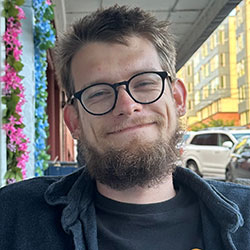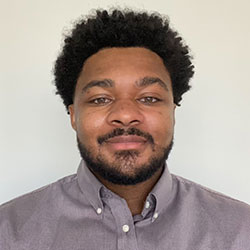Lawrence Chillrud and Essien Taylor Awarded NSF Graduate Research Fellowships
The five-year fellowship is awarded to outstanding students pursuing a graduate degree in STEM
Northwestern Engineering electrical and computer engineering PhD students Lawrence Chillrud and Essien Taylor have been awarded US National Science Foundation (NSF) Graduate Research Fellowships in recognition of their demonstrated potential for significant research achievements.
The highly selective Graduate Research Fellowship program awards a five-year fellowship to outstanding individuals pursuing a full-time, research-based graduate degree in science, technology, engineering, and mathematics (STEM) disciplines. The students will receive three years of financial support, including an annual stipend.
Lawrence Chillrud
 Chillrud, a second-year PhD student in electrical engineering at the McCormick School of Engineering, is a member of Aggelos Katsaggelos's Image and Video Processing Lab and co-adviser Lee Cooper’s Computational and Integrative Pathology Group.
Chillrud, a second-year PhD student in electrical engineering at the McCormick School of Engineering, is a member of Aggelos Katsaggelos's Image and Video Processing Lab and co-adviser Lee Cooper’s Computational and Integrative Pathology Group.
Chillrud is developing machine learning methods for applications in biomedical imaging. He aims to create robust uncertainty quantification techniques for medical imaging models and to design reliable algorithms that can assist doctors and patients in making informed decisions.
“Knowing when to trust these complex predictive models in high-stakes clinical settings is of critical importance,” Chillrud said. “If a model could reliably estimate its case-by-case uncertainty, clinicians could have a better understanding of how to integrate model predictions in data-driven decision-making, and patients could be better informed and in control of their disease and treatment plan.”
Chillrud is working on two research projects. In his radiological work, he is developing models that seek to predict the presence or absence of important brain tumor biomarkers in a patient’s MRI scan. In pathology, Chillrud is investigating computational techniques to help renal pathologists identify patients most at risk of kidney transplant failure.
Chillrud earned a bachelor’s degree in computer science from Columbia University in 2020. Prior to joining Northwestern, Chillrud was a senior programmer in the Department of Environmental Health Sciences at Columbia University’s Mailman School of Public Health. His research into the development of interpretable machine learning methods for assessing complex mixtures of environmental exposures in epidemiological studies with mentor Marianthi-Anna Kioumourtzoglou ignited Chillrud’s passion for research and inspired him to pursue a PhD.
“I feel tremendously lucky to have been awarded the fellowship and believe that it speaks more to the exceptional support and mentorship I have received over the years from advisers, colleagues, teachers, friends, and family, than it does say anything about me personally,” Chillrud said. “I am also hugely grateful to the NSF for their support during this early and exciting stage of my career.
Katsaggelos is the Joseph Cummings Professor of Electrical and Computer Engineering and (by courtesy) professor of computer Science at Northwestern Engineering and professor of radiology at Northwestern’s Feinberg School of Medicine. Cooper is the director of the Institute for Artificial Intelligence in Medicine’s Center for Computational Imaging and Signal Analytics in Medicine and associate professor of pathology and preventive medicine at Feinberg and (by courtesy) associate professor of electrical and computer engineering.
Essien Taylor
 Taylor, a second-year PhD student in computer engineering in the Power and Reliability Aware Architecture Lab, is advised by Russell Joseph, associate professor of electrical and computer engineering and of computer science at Northwestern Engineering.
Taylor, a second-year PhD student in computer engineering in the Power and Reliability Aware Architecture Lab, is advised by Russell Joseph, associate professor of electrical and computer engineering and of computer science at Northwestern Engineering.
Taylor investigates computer architecture and aims to reduce energy consumption in power-constrained embedded systems, including electronic medical implants and mobile phones.
“Understanding the energy consumption of microprocessors requires detailed models that take a large amount of time and labor to create,” Taylor said. “My current work will generate these complex models in a fraction of the time and effort, allowing us to rapidly explore countless research avenues.”
In 2023, the financial support of his GEM Fellowship afforded Taylor the opportunity to intern with Cadence Design Systems Inc., which aided his approach to electronics design.
Taylor is also a member of the Karsh STEM Scholars Program at Howard University, where he earned a bachelor’s degree in computer engineering. The program provides full scholarships for undergraduate students in science, technology, engineering, and mathematics disciplines and support for underrepresented minorities completing graduate programs in STEM.
“My experience as a Karsh STEM Scholar at Howard University was crucial in developing my passion for research,” Taylor said.
